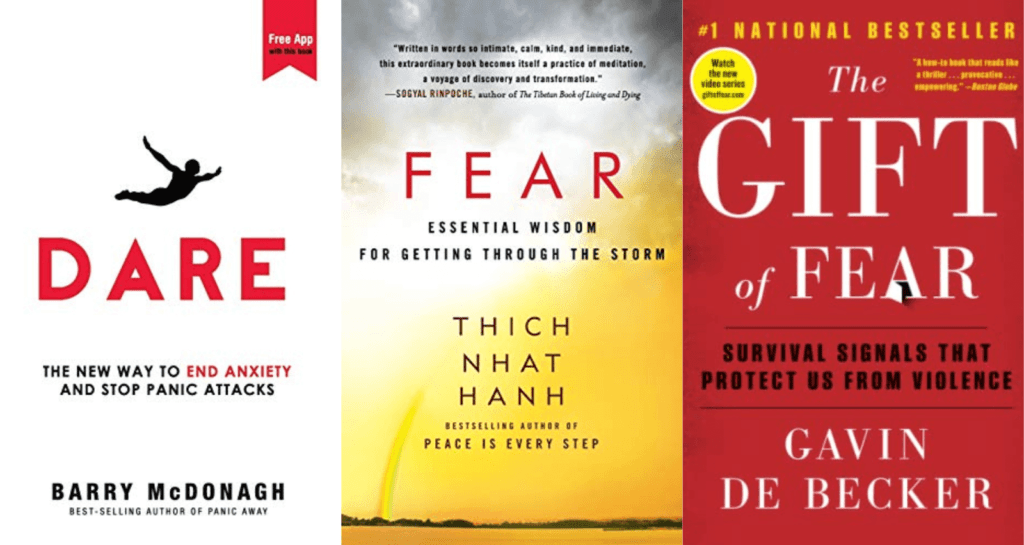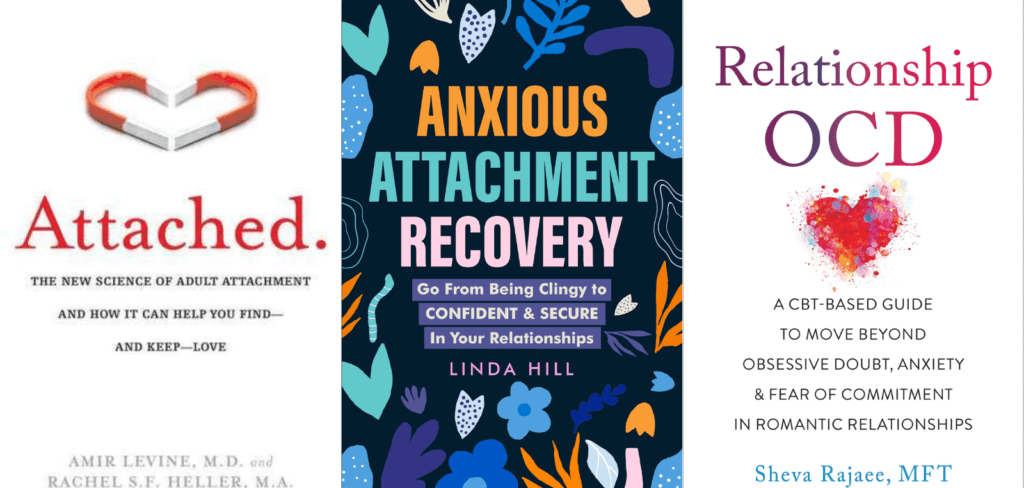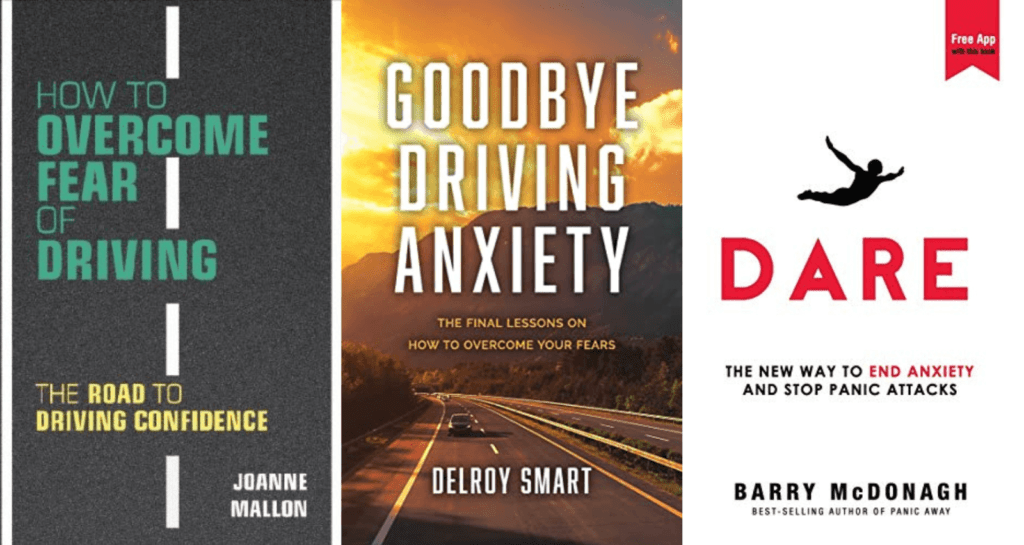The following are some of the best books about fear.
- Books About Fear
- 1. Feel the Fear… and Do It Anyway
- 2. Dare: The New Way to End Anxiety and Stop Panic Attacks
- 3. The Gift of Fear
- 4. Rewire Your Anxious Brain
- 5. Fear: Essential Wisdom for Getting Through the Storm
- 6. Homecoming
- 7. Building a Resilient Life
- 8. How Will You Measure Your Life?
- 9. Overcoming Fear, Worry, and Anxiety
- 10. The Anxiety and Phobia Workbook
- 11. Overcoming Unwanted Intrusive Thoughts
- 12. Don’t Believe Everything You Think
- 13. The Shyness and Social Anxiety Workbook
- 14. Putting an X Through Anxiety
- 15. A Book On Fear
- How Books About Fear Can Help
- Conclusion
Disclosure: Some of the links below are affiliate links. This means that, at zero cost to you, I will earn an affiliate commission if you click through the link and finalize a purchase.
Books About Fear
1. Feel the Fear… and Do It Anyway
By Susan Jeffers

Susan Jeffers approaches fear as a universal emotion that affects everyone at some point in their lives. She emphasizes that fear is not something to be avoided or suppressed, but rather an opportunity for personal growth and transformation. Through her insightful advice, Jeffers teaches readers how to develop healthier perspectives and coping mechanisms to navigate through their fears.
This book provides practical strategies on how to build self-confidence, create positive affirmations, and take small steps towards facing fears head-on. Jeffers emphasizes the importance of taking action, even when feeling afraid, as it is the only way to truly overcome our limitations and expand our comfort zones.
Throughout the pages, Jeffers offers relatable examples and real-life stories that inspire and resonate with readers. Her empathetic and friendly writing style creates a comforting atmosphere, allowing readers to feel understood and supported on their journey towards self-empowerment.
Related: Best 9 Tips On How To Stop Avoidance Coping (+FREE Worksheets PDF)
2. Dare: The New Way to End Anxiety and Stop Panic Attacks
By Barry McDonagh

Barry McDonagh, a renowned expert in the field of anxiety management, shares his personal experiences and deep understanding of the challenges individuals face when dealing with anxiety. His gentle and compassionate writing style creates an atmosphere of trust and reassurance, making it easier for readers to navigate their own anxiety journeys.
What sets “Dare” apart is its emphasis on embracing anxiety as an ally, rather than an enemy. Rather than attempting to erase anxiety from one’s life, McDonagh teaches readers how to face their fears head-on and transform their relationship with anxiety. Through a unique combination of mindfulness exercises, cognitive restructuring, and exposure therapy, readers will learn effective strategies to dismantle the cycle of anxiety and panic attacks.
The book encourages readers to adopt a patient and kind approach towards themselves, emphasizing self-compassion and self-care throughout the healing process. It provides step-by-step guidance on implementing practical techniques that can easily be incorporated into daily routines, empowering readers to take charge of their anxiety management.
Related: Hikikomori Test (+FREE Worksheets)
3. The Gift of Fear
By Gavin de Becker

Drawing from his extensive experience as a security expert and consultant, de Becker shares invaluable insights into understanding fear and how to utilize it as a valuable survival tool. Through gripping real-life stories and compelling anecdotes, he guides readers through the various forms that fear can take, whether it be a fleeting intuition or a persistent feeling of unease.
One of the book’s core messages is the importance of trusting our gut instincts, as de Becker delves into the science behind these intuitive warnings. By explaining the psychological and physiological mechanisms at play, he empowers readers to recognize and trust these feelings, ultimately enabling them to make informed decisions about their personal safety.
“The Gift of Fear” also delves into the darker aspects of human behavior, exploring the tactics and patterns employed by stalkers, abusers, and other potential perpetrators. De Becker provides practical advice on how to identify and respond to these threats, emphasizing the importance of setting boundaries, cultivating awareness, and seeking help when needed.
Related: Top 10 Social Withdrawal Signs — & How To Social Isolation? (Hikikomori Syndrome)
4. Rewire Your Anxious Brain
By Catherine M. Pittman PhD, Elizabeth M. Karle MLIS

Pittman and Karle’s approach is rooted in scientific research and backed by years of experience in the field. They present complex concepts in a clear and accessible manner, ensuring that readers can easily grasp and apply their practical strategies.
With compassion and empathy, the authors guide readers through the process of rewiring their anxious brain. They provide step-by-step techniques to target anxiety at its root, helping individuals gain control over their thoughts, emotions, and behaviors. From identifying triggers to effectively challenging negative thinking patterns, this book equips readers with the tools needed to cultivate a calmer and more balanced mindset.
Related: Top 10 Practical CBT Exercises For Generalized Anxiety Disorder Relief
5. Fear: Essential Wisdom for Getting Through the Storm
By Thich Nhat Hanh

In this enlightening book, Thich Nhat Hanh explores the roots of fear, its manifestations in our daily lives, and how it affects our well-being. With great wisdom and clarity, he provides practical tools and practices to help us embrace fear with mindfulness, courage, and compassion.
Through personal anecdotes, meditative exercises, and simple yet powerful techniques, Thich Nhat Hanh teaches us to face our fears by cultivating presence, understanding, and resilience. He shares timeless teachings on how to develop a deep awareness of our thoughts and emotions, and how to relate to them with kindness and curiosity.
Related: 30 Day Social Anxiety Challenge That Will Help You Feel More Confident
6. Homecoming
By Thema Bryant Ph.D.

This empowering book offers a roadmap for those who have experienced trauma, guiding them towards a path of self-acceptance, resilience, and personal growth. Dr. Bryant’s gentle and patient approach creates a safe space for readers to explore their emotions, confront their past experiences, and navigate the complex process of healing.
Through personal anecdotes, case studies, and powerful exercises, “Homecoming” provides valuable guidance on how to rebuild shattered foundations and rediscover our true selves. Dr. Bryant emphasizes the importance of self-compassion and self-care, while offering strategies to overcome fear, shame, and self-doubt.
Related: How to Overcome Fear In Life? 5 Actionable Steps To Conquer Fear And Get Unstuck
7. Building a Resilient Life
By Rebekah Lyons

Through personal anecdotes, thought-provoking reflections, and practical exercises, Lyons demonstrates how adversity can become a catalyst for personal growth and transformation. She offers invaluable tools and strategies to help readers navigate through difficult times, whether it be loss, setbacks, or unexpected life changes.
With warmth and empathy, Lyons reminds readers that resilience is not about avoiding pain or hardships, but rather developing the capacity to bounce back and thrive in the face of adversity. By exploring themes such as self-care, vulnerability, faith, and community, she provides a roadmap for building a resilient life filled with purpose, joy, and fulfillment.
Related: Living A Double Life? 8 Ways to Stop Leading A Secret Life
8. How Will You Measure Your Life?
By Clayton M. Christensen, James Allworth, Karen Dillon

Supported by real-life examples and engaging anecdotes, the authors draw from business theories and strategies to provide practical advice for personal growth and decision-making. They emphasize the importance of aligning one’s actions and values with long-term goals, and offer guidance on navigating career choices, relationships, and personal well-being.
With a gentle and patient tone, the authors encourage readers to consider their own aspirations and define success on their own terms. The book promotes self-reflection and highlights the significance of finding purpose and balance in all aspects of life.
Related: How To Thrive As A Highly Sensitive Person? [HSP’s Survival Guide]
9. Overcoming Fear, Worry, and Anxiety
By Elyse Fitzpatrick

Fitzpatrick addresses the common struggles that many women face when it comes to fear, worry, and anxiety. Drawing from her own experiences and years of counseling others, she provides practical tools and biblical insights to help readers break free from these paralyzing emotions.
Through relatable stories, personal anecdotes, and powerful Scriptures, Fitzpatrick demonstrates how faith in God’s promises can transform our mindset and empower us to overcome fear and anxiety. She gently guides readers on a journey towards cultivating a strong foundation in God’s love and unchanging nature, teaching them to lean on His strength even in the midst of uncertainty.
Related: Best 5 Avoidant Personality Disorder Books
10. The Anxiety and Phobia Workbook
By Edmund J Bourne PhD

In this workbook, Dr. Bourne combines his wealth of knowledge with a gentle and empathetic approach, making it an ideal resource for anyone struggling with anxiety-related challenges. Whether you’re dealing with general anxiety, panic attacks, social anxiety, specific phobias, or other related disorders, this book provides step-by-step guidance on how to regain control and find relief.
The workbook format allows readers to actively engage in self-reflection and apply the strategies and exercises offered by Dr. Bourne. Through comprehensive explanations and easy-to-follow instructions, readers will gain a deeper understanding of anxiety and phobias, as well as practical tools to manage symptoms and work towards long-term recovery.
Related: High Functioning Anxiety Test (& How To Support Anxiety Recovery)
11. Overcoming Unwanted Intrusive Thoughts
By Sally M. Winston PsyD, Martin N. Seif PhD

Unwanted intrusive thoughts can cause significant distress and interfere with daily life, creating a profound impact on one’s well-being. Through this empowering guide, readers will gain a deeper understanding of the origins and nature of intrusive thoughts, as well as develop essential skills to effectively cope with them.
Key Features:
1. Cognitive-Behavioral Therapy (CBT) Approach: The book is rooted in the principles of CBT, a proven therapeutic approach that assists in understanding and modifying unwanted thought patterns.
2. Expert Guidance: Authored by respected psychologists Sally M. Winston and Martin N. Seif, this book combines their wealth of knowledge and years of experience in treating intrusive thoughts.
3. Practical Techniques: The authors provide practical exercises, activities, and case examples to help readers actively apply the strategies discussed throughout the book.
Related: Best 10 Books For Social Anxiety
12. Don’t Believe Everything You Think
By Joseph Nguyen

Nguyen guides readers through various cognitive biases and common thinking traps that often lead to distorted perceptions of reality. He explains how our thoughts can be influenced by external factors, societal conditioning, and our own past experiences, and offers strategies for cultivating a more open and flexible mindset.
Throughout the book, Nguyen emphasizes the importance of self-compassion and patience in the process of questioning and challenging our thoughts. He provides practical techniques for cultivating mindfulness and awareness, allowing readers to observe their thoughts without judgment and make conscious choices about what to believe.
Related: Impulsive vs Intrusive Thoughts (& How to Manage Them)
13. The Shyness and Social Anxiety Workbook
By Martin M. Antony PhD, Richard P. Swinson MD

The authors provide a comprehensive framework for tackling shyness and social anxiety. They offer valuable insights into the roots of these conditions, providing readers with a deeper understanding of their own experiences. By addressing the underlying causes, this workbook presents a path towards lasting change.
Within its pages, you will find a range of effective strategies and exercises that have been scientifically proven to alleviate shyness and social anxiety. These techniques are presented in a user-friendly format, making them easy to grasp and implement into daily life. From cognitive-behavioral therapy (CBT) techniques to mindfulness exercises, this workbook offers a diversified approach to address these challenges.
Related: What Causes Cognitive Distortions? (+Top 10 Common Cognitive Distortions & How To Challenge Them)
14. Putting an X Through Anxiety
By Louie Giglio

Giglio takes readers on a transformative journey, offering a comprehensive understanding of anxiety and its impact on our mental and emotional well-being. With a gentle and patient tone, he explores various facets of anxiety, including its root causes, triggers, and the debilitating effects it can have on our daily lives.
This book goes beyond mere explanations and delves into practical solutions. Giglio introduces proven techniques and exercises that empower readers to challenge and overcome their anxiety. Drawing from his own struggles, as well as the experiences of others, he provides guidance on developing healthy coping mechanisms, cultivating resilience, and nurturing a positive mindset.
Throughout the pages of “Putting an X Through Anxiety,” Giglio emphasizes the importance of self-care, offering invaluable insights on maintaining physical, mental, and spiritual well-being. He encourages readers to embrace self-compassion, practice mindfulness, and build a support network to aid in their journey towards healing and freedom from anxiety.
Related: How To Overcome Agoraphobia Without Medication? 9-Step Guide To Control Panic Attack In Public
15. A Book On Fear
By Lawrence Doochin

This book is a comprehensive resource that delves into the deep-rooted causes of fear, examining how it can manifest as anxiety, phobias, or even paralyzing self-doubt. Doochin’s friendly tone helps readers feel understood and supported as they uncover the origins of their own fears.
Through a blend of personal anecdotes, inspirational stories, and transformative exercises, Doochin gently encourages readers to explore their fears without judgment or shame. He emphasizes the importance of self-compassion and offers guidance on building resilience and cultivating a sense of safety in an often challenging world.
Related: Best 10 Panic Attack Books

How Books About Fear Can Help
Books about fear can be incredibly helpful in many ways. Here are a few reasons why:
1. Understanding Fear: Books can help us understand the complexities of fear. They often explore the psychological, emotional, and physiological aspects of fear, shedding light on its origins and manifestations. This deeper understanding can be empowering, as it allows us to recognize and address our fears more effectively.
2. Overcoming Fear: Many books offer practical strategies and tools to overcome fear. They provide guidance on how to confront and manage fear, offering step-by-step approaches that can be implemented in real-life situations. These techniques can help us develop resilience and courage to face our fears head-on.
3. Building Empathy: Books about fear often feature characters who experience fear in various forms. By empathizing with these characters, we develop a greater understanding of different perspectives and experiences related to fear. This empathy can help us navigate our own fears with compassion, both for ourselves and for others.
4. Inspiring Personal Growth: Reading stories of individuals who have overcome their fears can inspire and motivate us to do the same. These tales serve as reminders that fear is not insurmountable, and that personal growth and self-discovery can be achieved even amidst fear and uncertainty.
5. Expanding Perspectives: Books about fear come in many genres and styles, offering diverse narratives and perspectives. Exploring these books exposes us to a range of viewpoints on fear, fostering a broader understanding of the human experience. This expanded perspective can be invaluable in managing our own fears and developing empathy towards others.
6. Relaxation and Distraction: Some fiction books with elements of fear or suspense can provide a temporary escape from our own worries and anxieties. Engaging in these narratives allows us to temporarily shift our focus away from our own fears and immerse ourselves in a different world.
Conclusion
Books about fear can be powerful tools for personal growth, self-reflection, and finding courage.
They offer guidance, inspiration, and understanding, reminding us that fear is a universal emotion that can be navigated and conquered.



